It’s hard to believe sometimes. Every now and then you read about someone and it is really hard to believe that so much came from one person. Cary Grant – one man – exuded that much charm in that many film roles? Yep. Kate Hepburn? Jimmy Cagney? Martin Scorsese? That many films? Yep. What about music? Try to pick only 10 great Frank Sinatra songs. Tough job; the man recorded that many great tunes and it is hard to pick just ten. The Rolling Stones. Did they ever release a substandard, boring album? Brian Wilson, Carole King, Paul McCartney, Billy Joel – how could they have had so many hits in them? Some people really do have that much talent and artistry. A knack, for lack of a better term. Today we’re talking about another person with that much music in him. Today he remains a living legend – Mr. Jimmy Webb.
Jimmy was born in 1946 in Elk City, Oklahoma, a city in Beckham County right on the Texas border. Webb was one of seven children born to a Baptist minister and he got his start playing in his father’s church. A Marine, Robert Lee Webb presided over rural churches in the area and Jim played piano, organ and guitar for services while starting to rearrange venerable, old hymns and writing his own. In the Webb home, radio listening was restricted to country music and white gospel and that was fine with Jimmy – until he heard Elvis Presley. Webb then began exploring popular music and bought his first record when he was 14 in 1961 – Glen Campbell’s “Turn Around, Look at Me”. Three years later, the Webbs moved to SoCal and Jimmy enrolled in school to study music but tragedy struck when his mother died. Mr. Webb planned to move the family back to Oklahoma but Jimmy decided to stay on, quit school and become a professional songwriter. Imagine the dynamic between Jimmy Webb and his minister father. Mr. Webb told his son “this songwriting thing is going to break your heart” – but he gave his son his last $40 saying “it’s not much but it’s all I have”.
In 1965, when Jim was 19 years old, he was signed to a songwriting contract with Jobete Music, the publishing arm of Motown Records. That Christmas, Jimmy’s “My Christmas Tree” was included on the Supremes’ Christmas record and then he came to the attention of Johnny Rivers. Johnny’s 1966 LP Changes featured the first recording of Webb’s song “By the Time I Get to Phoenix”.
A modern torch song, “By the Time I Get to Phoenix” tells a sad story. It’s the tale of a break-up, of a man who has threatened to leave an unfortunate relationship many times in the past. He has vowed to leave so often that the woman has ceased believing the man will ever carry out his repeated threat. It tells of an early morning and of a man who has packed quietly and left the shared dwelling and has hit the road. As he drives he ponders the woman’s waking up and wondering where he has gone. She will read the note he has left and laugh. She will call during her lunch break and get no answer. Finally, late the next night, she calls for him and when he doesn’t reply it hits her. It’s quite a sad song.
Broadcast Music – BMI – tracks songs as it monitors performance rights. In 1990, BMI listed “By the Time I Get to Phoenix” the third-most performed song during the period of 1970 to 1990 and eventually it was said to be among the most performed songs of the 20th century. Jim’s friend Glen Campbell claimed it as his own with his 1967 version and the song quickly became a contemporary standard; I count 62 versions of the song released in 1968 alone by the likes of…well, by everyone. From Gary Puckett and the Union Gap, the Classics IV, the Intruders and the Four Tops to Conway Twitty, Eddy Arnold, Marty Robbins and Frankie Laine to Frank Sinatra, Jerry Vale, the Mills Brothers, Robert Goulet, Eydie Gormé, Andy Williams, the Lettermen… In 1969, things slacked off – only 42 versions. In 2023, jazz saxophonist Joshua Redman included it on his travelogue album Where Are We and on it goes. To date, over 370 versions of the song have been recorded.
The following year – 1967 – Johnny Rivers released the album Rewind that featured 7 (of the record’s 11) songs by Jimmy Webb. Also that year, Johnny had taken to producing music for the 5th Dimension, a brand new group at the time. Five of the 11 songs on the group’s debut album were Webb compositions including the title track, which we’ll talk about next.
“Up, Up and Away” is sunshine pop at its most sugary. While it may be the most buoyantly vapid of Webb’s classic songs, it became another major hit, launching both Webb and the 5th Dimension – the whitest soul act ever – into stardom. At the 1968 Grammy awards, the song won six – count ’em, six – awards including Record of the Year and Song of the Year. This song that is so indicative of an era would eventually be recorded almost 200 times; though the song’s appeal is somewhat more ephemeral as most of the covers had appeared by 1970. There are versions out there by Humperdinck, Bing Crosby, Smokey & the Miracles, Sammy Davis, Jr. and others. Even more so was the song commonly recorded as an instrumental. By this point, then, Jimmy Webb was an accomplished songwriter and arranger with two massive hits to his name. He was 22 years old.
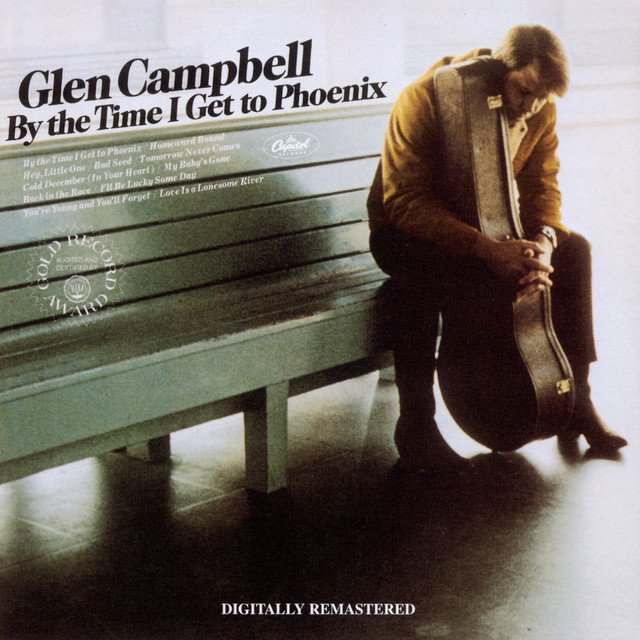
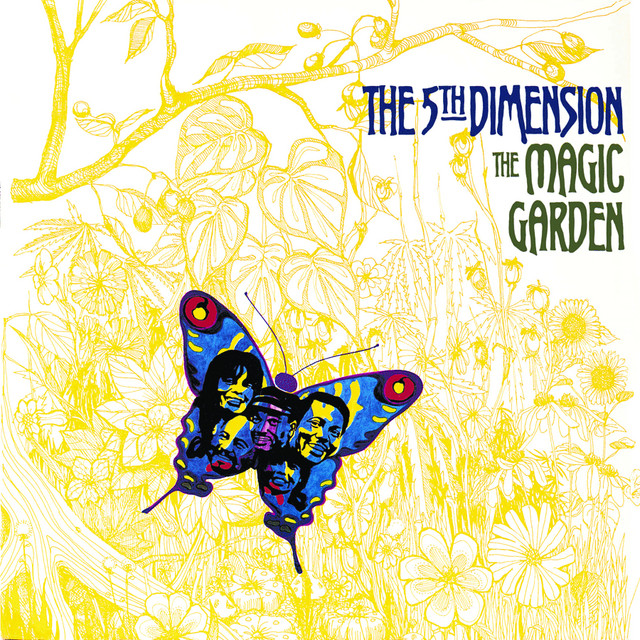
Here re-enters Glen Campbell. Glen asked Jim for another “geographical place” song as a follow-up to “By the Time I Get to Phoenix”. “Within hours”, Jim delivered an unfinished demo tape to Glen with a song on it called “Wichita Lineman”. It was a tale of longing that told of a solitary man, a lineman working alone atop a telephone pole and thinking about his girl. The story in the song is certainly unique and on the surface it would seem like it would not be possible to write a song of any import about such a man or situation. But this is a case of many things coming together to create a gem, a song that has been called “the first existential country song”.
Though the song Glen Campbell heard on the acetate Jimmy sent was unfinished, Campbell wept when he heard it. Glen has said that he was homesick at the time and the song and the sentiment struck a chord. Then Glen’s producer/arranger Al DeLory got involved. DeLory loved the song “right away” because it had reminded him of his uncle, a lineman in California. Only two people had heard the song and both had been touched. DeLory created a stunning and emotional arrangement that featured Campbell playing a striking though simple solo on a Dano bass. The backing track also contains sounds that evoke the “singing through the wire” of the lyric and the sound of the Morse code that a lineman might hear in an earpiece. Webb’s simple but evocative lyric was given this sensitive arrangement and then Glen added his gentle vocal. One can hear the emotion in his voice when he masterfully delivers the highlight of the song. A simple couplet that never ceases to touch me, maybe the greatest two lines of any song ever composed – “and I need you more than want you – and I want you for all time…”.
Official Glen
Everything coalesced to create this masterpiece. Webb hadn’t heard from Campbell after he sent the rough draft of the song. When the two did meet later, Webb assumed Glen hadn’t liked the song. When Campbell surprised his buddy by saying they had already cut the track, Webb added overdubs on electric organ. Glen Campbell’s recording of “Wichita Lineman” reached Number 3 on the US Pop charts but more than that it became yet another standard from Webb’s pen. This one in particular has reached mythic proportions. No less an authority than Bob Dylan actually declared it “the greatest song ever written” and author Dylan Jones devoted an entire book to appreciating and understanding this venerable tune; The Wichita Lineman: Searching in the Sun for the World’s Greatest Unfinished Song (2019). In the 15 months after Campbell’s initial version was released, 38 covers appeared and we are at over 340 as of this writing. Even Guns ‘N Roses began including “Wichita Lineman” on their setlist on tour in 2023.
Jimmy wrote “MacArthur Park” in the summer and fall of 1967 as part of an intended cantata. Bones Howe, producer for the Association, had challenged Webb to write a pop song with different movements and time signatures and so “no sweat” Jim said and he did just that. The same break-up that inspired “By the Time I Get to Phoenix” inspired the tale told in “MacArthur Park”. Webb has said that the park was a place that he and his girl would go and have some of their best times together; “everything in the song was visible. There’s nothing in it that’s fabricated. It’s a kind of musical collage of this whole love affair that kind of went down in MacArthur Park…Back then, I was kind of like an emotional machine, like whatever was going on inside me would bubble out of the piano and onto paper”. Jim says “there were picnics in the park. There was cake. It did rain” but he also admits that the song could be taken as “one of the hallucinogenic songs” popular at the time loaded with surrealism and ambiguity. But Bones didn’t like “MacArthur Park” and rejected it for the Association. So, Jimmy kept it in his trunk.
Then he met Irish actor, drinker and erstwhile singer Richard Harris. Fresh off Camelot – a film in which he sang – Harris told Webb he wanted to make a record and the two met in London. Nothing was working until Jim dusted off “MacArthur Park” and it became the centerpiece of Harris’ debut, A Tramp Shining, an album written and produced by Webb. The bold decision was made to release “MacArthur Park” – over seven minutes in duration – as the single. It vaulted to Number Two US Pop (behind Herb’s “This Guy’s in Love With You”) and propelled the album to Number Four and to a Grammy nom for Album of the Year.
This is a tough one. I feel like you either love “MacArthur Park” or you hate it. You could be forgiven for saying flat-out that the lyrics are preposterous. I have always struggled accepting the “cake out in the rain” imagery. I mean, I get it; baking a cake is indeed like forging a relationship. Many ingredients go into it, many things need to be present in the appropriate proportions. But a song of grandiose drama featuring a singer boldly making these types of statements can sound like parody; “I don’t think that I can take it ’cause it took so long to bake it and I’ll never have that recipe again”. And speaking of parody, for me personally I had the misfortune of being introduced to this song by the SCTV Network. Dave Thomas did Richard Harris on Mel’s Rockpile; those who know will know (see it here).
Harris’ hit version features a robust and inventive arrangement which helps to carry the song; indeed, Webb’s arrangement for this version keeps it distinct from almost any other treatment – listen to Sinatra’s; sounds like a totally different song. Notably, Donna Summer and her producer Giorgio Moroder built their own ambitious disco version of “MacArthur Park” that topped the US Pop charts in 1978 – to date it is the only recording of a Jimmy Webb composition to top the Hot 100. Like many of his songs, many versions followed, over 200; Waylon Jennings (Grammy winner), Carmen McRae, John Gary, Jerry Vale, the Four Tops, Jerry Reed & Chet Atkins, Vic Damone, Glen Campbell, the Ventures…
Official Jimmy
“Worst That Could Happen” was a Number 3 US Pop hit for the Brooklyn Bridge in early 1969. It is the third of Jimmy Webb’s legendary songs to have been inspired by his relationship with one woman. Read her story here. The Brooklyn Bridge’s version – with a lead vocal from their singer, Johnny Maestro, formally of the Crests – sports a robust and dramatic arrangement adding import to the lyric about a woman marrying someone other than the singer; “maybe it’s the best thing for you but it’s the worst that could happen to me”. Number One Country and Number One Easy Listening was Glen Campbell’s rendition of Jim’s song “Galveston” from February of ’69. Here’s a tale of a soldier doing his duty and dreaming of his girl and home; “Galveston, oh Galveston, I still hear your sea waves crashing. While I watch the cannons flashing, I clean my gun and dream of Galveston. Is she waiting there for me, on the beach where we used to run?”
We have only scratched the surface. Today we have highlighted merely the very pinnacle of the songs of Jimmy Webb. I’d like to mention a few more notables. I have written before of the Christmas music of Frank Sinatra and took time to mention his album made with his kids The Sinatra Family Wish You a Merry Christmas. I noted that Nancy’s devastating “It’s Such a Lonely Time of Year” is the highlight of the record but it also features Jim’s “Whatever Happened to Christmas”, a sad lament of the modern holiday having lost some of its meaning; “Whatever happened to the singing, the songs we used to know? Whatever happened to this Christmas and when did it disappear from view? Where was I and whatever happened to you? Whatever happened to Christmas and you?”
“Where’s the Playground Susie” is another Jimmy Webb song recorded by Glen Campbell and it is another wistful song, one that is filled with questions and confusion. It’s the end of a relationship and now neither knows where to go or what to do; “The carousel has stopped us here, it twirled a time or two and then it dropped us here. And still you’re not content with something about me but what merry-go-round can you ride without me to take your hand?” Sinatra dug deep into Jimmy’s trunk and found “Didn’t We”, including it on his 1969 My Way LP. A melancholy lament of the “almost”, “Didn’t We” is a song of frustration and failure; “this time we almost made our poem rhyme and this time we almost made that long, hard climb. Didn’t we almost make it this time?” New to me while researching Webb for this piece is “The Moon is a Harsh Mistress”. Here, Jimmy admits to “appropriating something from another writer”. Webb borrowed the striking title from the book of the same name by science fiction writer Robert Heinlein. Jim thought it was “the best title I’ve ever heard in my life” and he reached out to Heinlein’s attorneys for permission to use it. “Harsh Mistress” was first recorded by Joe Cocker on his 1974 album I Can Stand a Little Rain, featuring the hit “You Are So Beautiful”. In 2013, Jimmy released an album of duets called Still Within the Sound of My Voice on which Cocker joins him to revisit this striking song. This proved to be Joe Cocker’s last recorded performance. The somewhat inscrutable lyrics retain their poignancy and a sparse and delicate piano-centric arrangement present the song in its best light. “I fell and I fell alone. The moon’s a harsh mistress and the sky is made of stone”
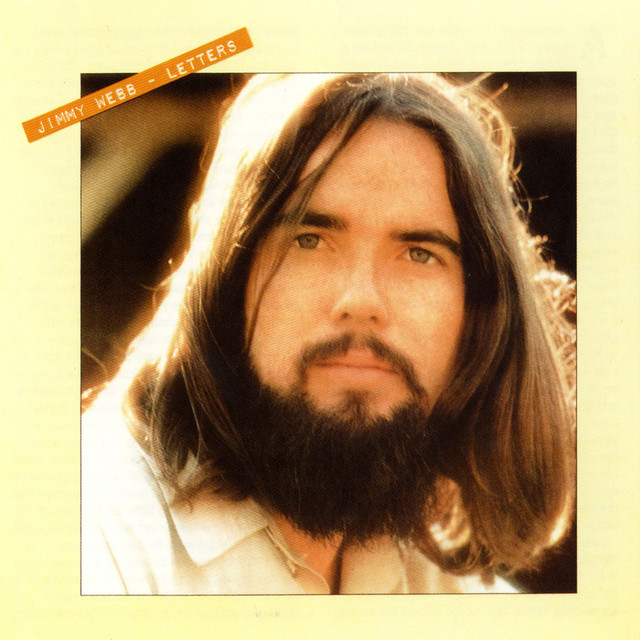
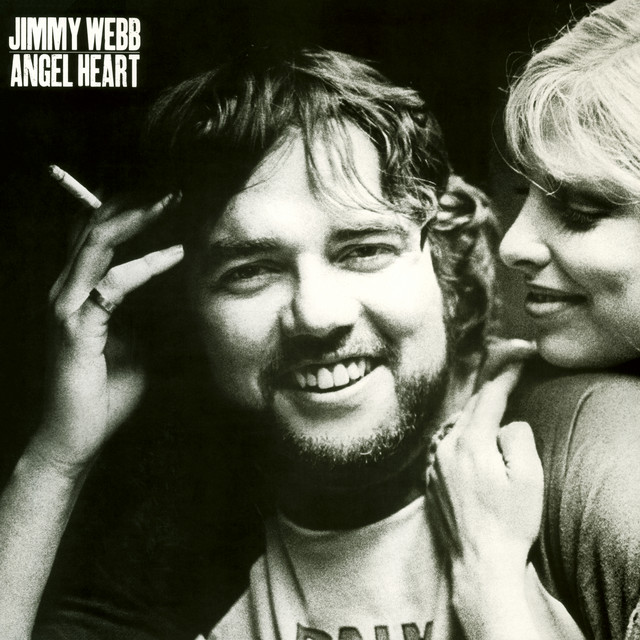
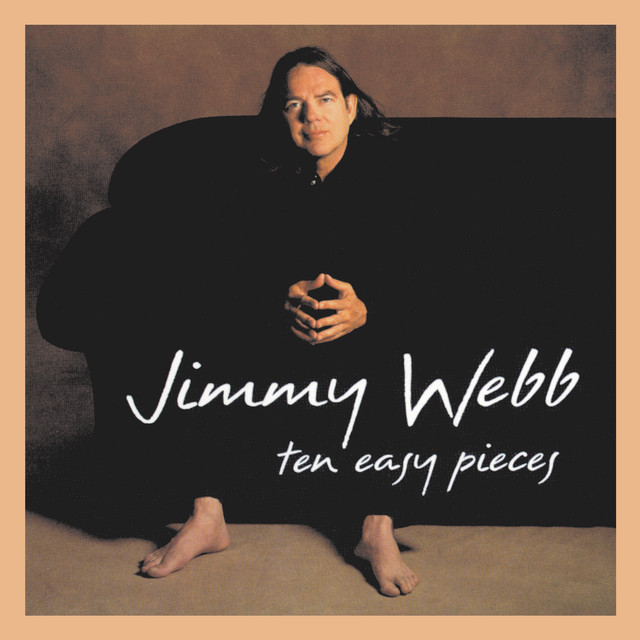
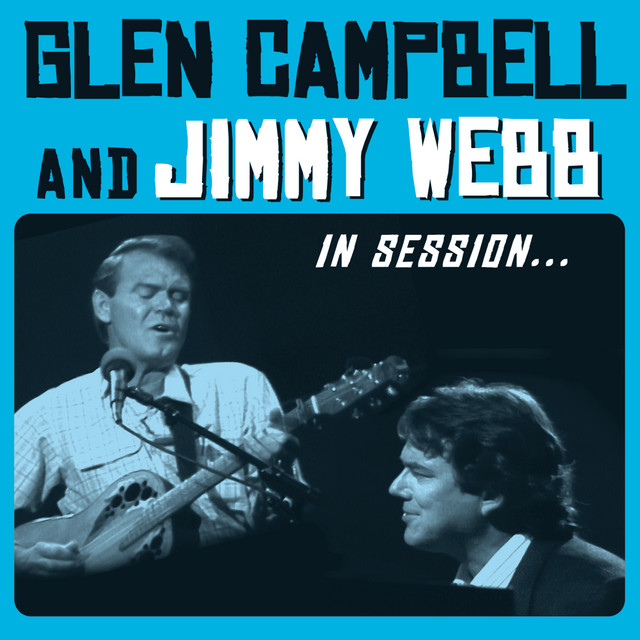
Lastly, I’d like to share a personal favourite. 370 versions of “By the Time I Get to Phoenix”? There are only three versions of “Postcard from Paris” which is just as well – it is one of the saddest songs I’ve ever heard. First recorded by John Denver in 1990, this was another of Webb’s songs to be interpreted by Glen Campbell, this one at the very end of Glen’s recording career and his life. I found Campbell’s See You There album – his last before his final release, Adiós from 2017 – on CD at a thrift store. I remember distinctly being on a family vacation and driving through Bowling Green, Kentucky. Seemed like Campbell Country so I put on See You There and “Postcard from Paris” hit me hard; so hard that I was no good to my family for the rest of that day. I may never have thought of Glen Campbell as a “singer”, exactly – then why was he still giving such poignant vocal performances into his 70s? I’m telling you, when I hear him sing “I wish you were here” for the first time in this song, I could bust out crying. “I make my way to a small cafe, I wonder what you did today. I wish you were here…” “Postcard from Paris” is devastating. It is incredibly tender and fragile and it is terribly sad – but not without hope. The lovers are apart but they have not separated and the singer is returning. But in the meantime there is this…despondency. “Lovers walkin’ hand in hand, they take one look at me and they seem to understand…(I’m) wondering how two people got so far apart…I’ll never leave you alone again. I’m coming home but until then – I wish you were here.”
Official Glen
Jimmy Webb wasted no time cementing his status in the pantheon. He had gained his enduring reputation as a songwriter by the time the Seventies dawned and at that point he pivoted and focused on recording his songs himself. Jimmy released a half-dozen albums throughout the 1970s and into the 80s in the singer-songwriter vein popular starting in the early 1970s. Virtually each and every one of his solo albums were met with critical acclaim (“Jimmy Webb is the most important pop music figure to emerge since Bob Dylan”) but with limited commercial notice. Through the years, Webb has also written musicals, classical music, film scores and has produced records for many artists. There is no area of music creation at which he has not excelled.
In 1968, Jimmy was featured in Teen Magazine. He met and was pictured on the cover with model Patsy Sullivan. Sullivan is the daughter of actor Barry Sullivan and his second wife, Swedish model and actress Gita Hall (Sullivan and Hall were married when he was 46 and she was 25). Funny but neither Jim nor Patsy were actually teens at the time; he was 22 and she was 12 years old. One year later, 1969, Jim and Patsy became romantically involved and in 1973 she gave birth to a son, Christiaan, when Patsy was still 16. The couple married a year later and there are many shots from the wedding available for viewing at Getty Images and other less mercenary places on the internet. The nuptials took place July 13, 1974 at singer Jim Messina’s ranch in Ojai, California and were attended by a diverse group including Ike Turner, Lynda Carter, Beau Bridges, Joni Mitchell, Joe Cocker, Harry Nilsson, Jack Warden and Jessica Walter. Jim and Patsy were together for 27 years, married for 22 and had six children together. Oddly, Jimmy does not mention Patsy at all in his 2017 memoir The Cake and the Rain.
Webb was also a prodigious substance abuser. During the 1970s, Jimmy regularly used alcohol, marijuana and cocaine. The latter in particular he says fuelled the recording business at that time. Webb suffered a near-fatal overdose in 1973 while snorting angel dust with Harry Nilsson and Jim was along with Harry and John Lennon as the three binged on cocaine during John’s “Lost Weekend”. It took until the early 1990s for Jimmy Webb to give up cocaine and he has been clean and sober since 2000.
Jimmy created entire records for the likes of Johnny Rivers (Rewind, 1967), The Fifth Dimension (The Magic Garden, 1967), Richard Harris (A Tramp Shining & The Yard Went on Forever, both 1968), Thelma Houston (Sunshower, 1969 and Breakwater Cat, 1980), Revelation (Revelation, 1970), The Supremes (The Supremes Produced and Arranged by Jimmy Webb, 1972), Glen Campbell (Reunion: The Songs of Jimmy Webb, 1974 and Light Years, 1988), Art Garfunkel (Watermark, 1977) and Michael Feinstein (Only One Life: The Songs of Jimmy Webb, 2003). When everyone loves you and wants to work with you, you end up leading a fascinating life. Trust me; I know. Jimmy Webb has worked with, written for and been lauded by just about every significant figure in 20th century music. To have written so many iconic songs is truly amazing.
Jimmy Webb is the only artist to receive individual Grammys for music, lyrics and orchestration. Discogs lists 3971 credits for Webb, Second Hand Songs lists over 1600 versions of his songs. He is a true living legend and perhaps even more than the enormity of the classic compositions highlighted here is his seemingly endless wellspring of melody and lyric. The man had a staggering amount of music in him. Didn’t he?
Ten by Webb
- By the Time I Get to Phoenix – Glen Campbell
- Worst That Could Happen – the Brooklyn Bridge
- Didn’t We? – Frank Sinatra
- Do What You Gotta Do – Tom Jones
- Wichita Lineman – Glen Campbell
- Christmasey – Brian Wilson
- Where’s the Playground Susie? – Jerry Vale
- The Moon is a Harsh Mistress – Jimmy Webb (from Ten Easy Pieces)
- The Highwayman – the Highwaymen
- Postcard from Paris – Glen Campbell
Sources
- Newsday.com – “Jimmy Webb discusses famous lyrics in ‘MacArthur Park'” (2014)
- Awaken.com – “Jimmy Webb On Auto-Tune, Lying To Keep John Lennon From Being Deported And How Cocaine Changed Music” (2023)
- FamousFix.com – “Patsy Sullivan and Jimmy Webb”
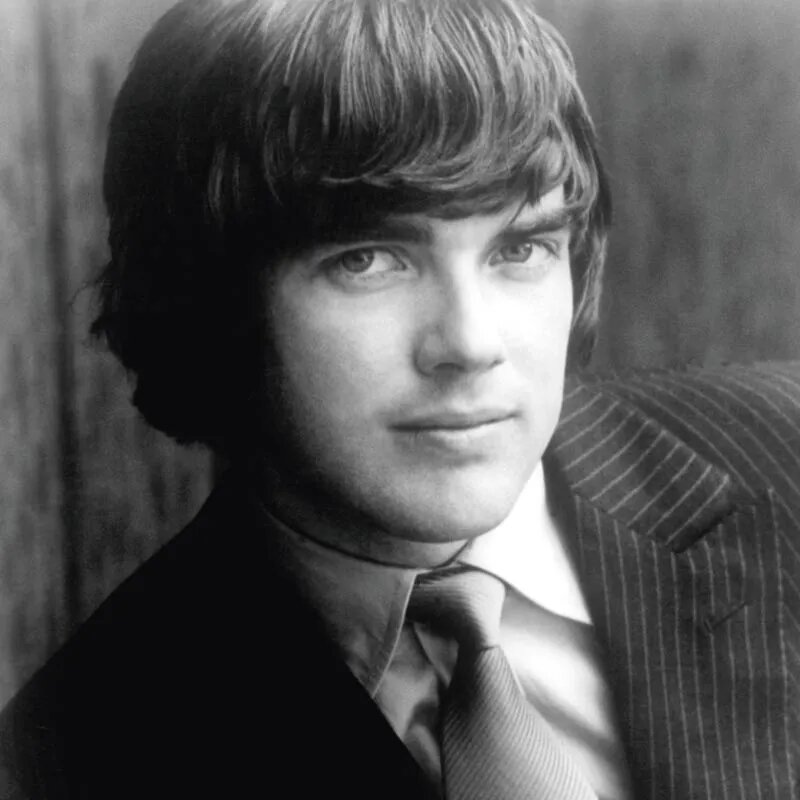
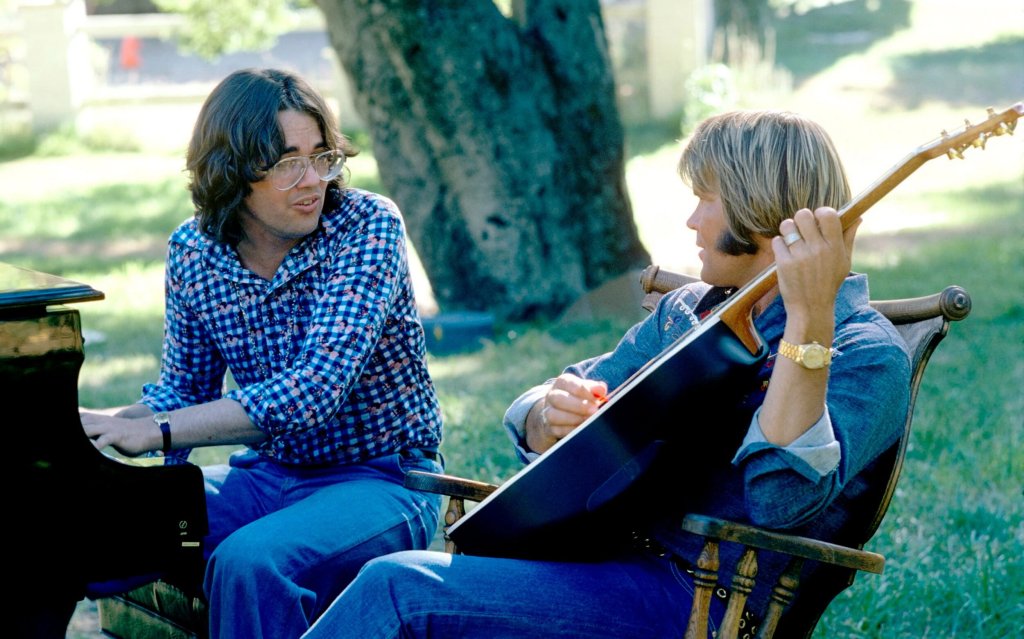
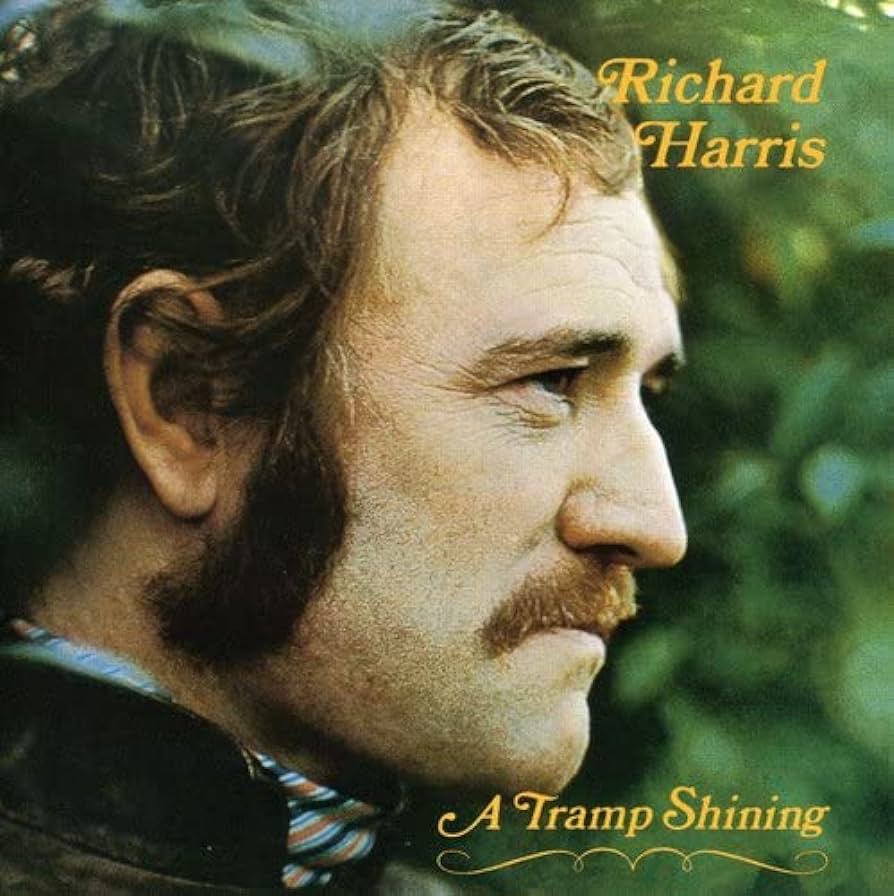
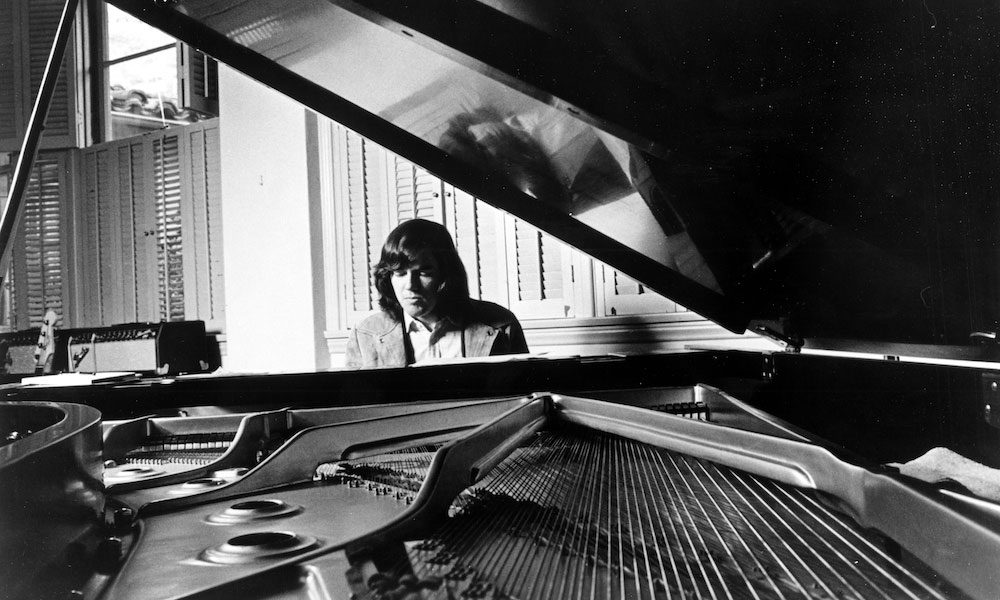
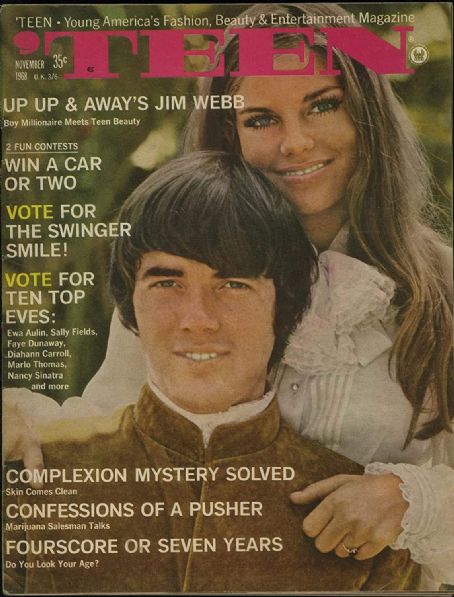
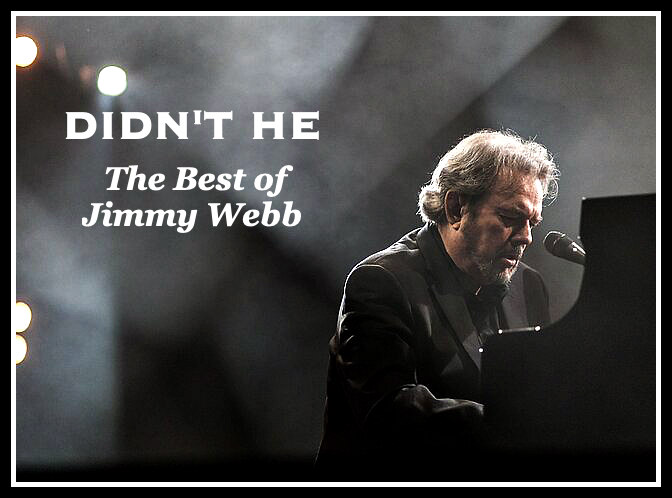
Thanks so much for this great background about one of my favorite songwriters, and the backstory on some of Jimmy Webb’s songs. I was always a Glen Campbell fan, as was my mom. When I was old enough to realize how many of my favorite songs were written by Jimmy Webb, I was immediately a fan of his, as well. I had been playing guitar, and writing my own songs since age 12. So, I was usually more interested in songwriters and singer/songwriters, than just those who performed the music.
As for “MacArthur Park” – I liked it when it first came out, though at just age 13, I admit, despite my poet inclination, I did not understand the lyrics. Many (MANY) years later, probably around age 50, I developed my own interpretation.
“Someone left the cake out in the rain
I don’t think that I can take it
‘Cause it took so long to bake it,
And I’ll never have that recipe again…”
To me, those particular lines fully expressed the sadness of aging. We look back at some of the best moments in our lives, with such angst, knowing we can never do those same things, achieve those accomplishments in the same way. Because all of it was a product of our youth, enthusiasm, energy, and hence, those perfect moments of synchronicity and convergence. And it just cannot ever be that way again.
Sad, but true.
Again, thank you for this interesting, enlightening, information about one of my favorite songwriters. I would love to see a similar piece about another of my favorites – the great, prolific poet Paul Williams.
It is really satisfying when someone – especially a regular like yourself – contributes such a thoughtful comment. It’s great to discuss these topics that mean something to us, isn’t it?
You make many interesting points and I love to hear how an artist has lingered with someone through the years. And I love your take on “MacArthur Park”; somehow adds to its gravitas to take it from a romantic relationship to the bigger concepts of life and the passage of time. So poignant when you put it that way. Those moments in time, those people, those places, those relationships….so fleeting and then the mists claim them.
I’ll always be grateful to Paul Williams for helping to create one of my Top 100 Favourite Songs – The Monkees’ “Someday Man”. But I am currently mad at Paul; I recently watched the 1976 version of A Star is Born and was really disappointed by Paul’s songs! 😡😉😅
Thank you for acknowledging my comments. Oh my! There was so much in your piece. Only after I posted my thoughts did I think about so many of the other songs. “Still Within the Sound of My Voice” as recorded (of course 😉) by Glen Campbell,i is on every iPod and iPhone I have ever had.
That’s funny – being mad at Paul Williams. Frankly, none of his songs from that film are among my favorites of his. But, give me “Waking Up Alone” or “Traveling Boy,” “What Would They Say,” – I can even completely relate to “Rainbow Connection.” Paul is pure genius – like Jimmy.
Thank you again. I reposted your blog on X.
Similarly, after I published, I was listening to In Session, Jim’s album with Glen and heard “Still Within the Sound of My Voice” and wished I had mentioned that one. But, heck, I could’ve mentioned SO many others so…
You make me realize I have heard very little of Paul Williams’ songs. Thanks for reposting!
I think you will really enjoy Paul Williams’ songs, particularly as performed by him. His voice is unique, for sure. But, his interpretations of his own music is great. There’s a lot more to Paul Williams than that guy many might only think of as Little Enos (“size 12 dwarf”) in “Smokey and the Bandit” or maybe think of him as the guy who wrote a lot of The Carpenters’ songs. I know you know better. But, seriously, there is some really deep poetry and emotion in Paul Williams’ music.
I don’t know much about him but I know enough to respect him. And if I was doing some series on songwriters he’d be included.
I totally agree with you and when I found out how many beautiful songs Paul has written I started to seek them out. Thanks to you both for some really great comments, I watched a Jimmy Webb interview on YouTube because of this piece.
Thanks for commenting, Tammy. Jimmy always gives a good interview; very intelligent and well-spoken.
Great and thought provoking as usual. In terms of MacArthur Park, through no fault of its own I think it has been diminished over the years, because it seemed to become a standard audition piece for talent shows or both daytime and night variety shows on television where the neither the vocalist nor the setting did it any kind of justice. ’Up Up and Away’ was used for years as the corporate anthem for a now long defunct Australian domestic airline, TAA. (Up, Up and Away, with TAA, the friendly, friendly way). The jingle, performed with varying grandiosity, became so ingrained that it was kind of a surprise to hear the original version… https://www.youtube.com/watch?v=w0pjq3ZzHUs
Just carrying on…the little moment in the ad, just past the 40 second mark, where the ground controller belts out “Come on and Fly” kind of became an iconic and favourite moment in 1970s Australian television….